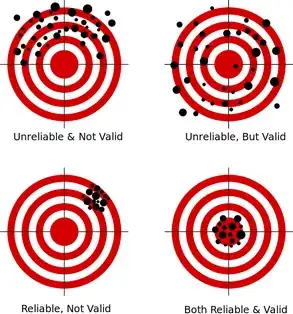A measure is said to have a high reliability if it produces similar results under consistent conditions. DO NOT confuse reliability with validity (see tag wiki). DO NOT use for inter-rater reliability which has its own tag inter-rater
Reliability refers to the overall consistency of a measurement, rather than its accuracy (how well it reflects some real, external quantity - i.e. validity).
Note that the meaning of this term varies slightly from one discipline to another. It may either refer to reliability in engineering, the bias variance trade-off illustrated below when characterizing the properties of an estimator or a statistical predictive model as a whole, or the consistency of a subjective or biological measure, both in time and across raters. In the latter case, related tags are agreement-statistics, intraclass-correlation, cohens-kappa, cronbachs-alpha.
Reference: Wikipedia

(Figure adapted from this image, created by Nevit Dilmen
under the Creative Commons Attribution-Share Alike 3.0 license.)